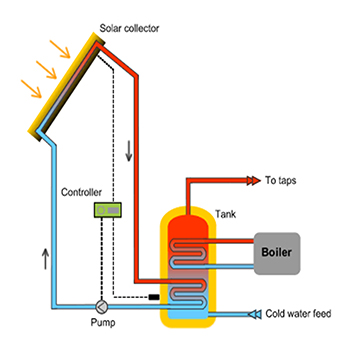Solar Water Heating System
One of the most cost-effective ways to include renewable technologies into a building is by incorporating solar hot water. A typical residential solar water-heating system reduces the need for conventional water heating by about two-thirds. It minimizes the expense of electricity or fossil fuel to heat the water and reduces the associated environmental impacts.
Solar Water Heating for Buildings Most solar water-heating systems for buildings have two main parts: (1) a solar collector and (2) a storage tank. The most common collector used in solar hot water systems is the flat-plate collector. Solar water heaters use the sun to heat either water or a heat-transfer fluid in the collector. Heated water is then held in the storage tank ready for use, with a conventional system providing additional heating as necessary. The tank can be a modified standard water heater, but it is usually larger and very well insulated. Solar water heating systems can be either active or passive, but the most common are active systems.

Advantages of Solar Water Heating
 They use solar energy which is a free, renewable source of energy.
They use solar energy which is a free, renewable source of energy. By using solar energy they help reduce our dependence on fossil fuels.
By using solar energy they help reduce our dependence on fossil fuels. In sunny and warm places with high insolation values solar water heating systems are highly cost effective.
In sunny and warm places with high insolation values solar water heating systems are highly cost effective. Many countries around the world offer favorable incentives for the installation of solar water heating systems.
Many countries around the world offer favorable incentives for the installation of solar water heating systems. Relatively good payback period, in average between 5-10 years.
Relatively good payback period, in average between 5-10 years. you can build your own solar water heating systems (you can find the charts on how to build them on Internet)
you can build your own solar water heating systems (you can find the charts on how to build them on Internet)
Why
Renewable Energy Source?
Save
 77kg Coal
77kg Coal
combustion
 136kg GHG emissions
136kg GHG emissions
into the atmosphere
 478ltr Water
478ltr Water
usage





